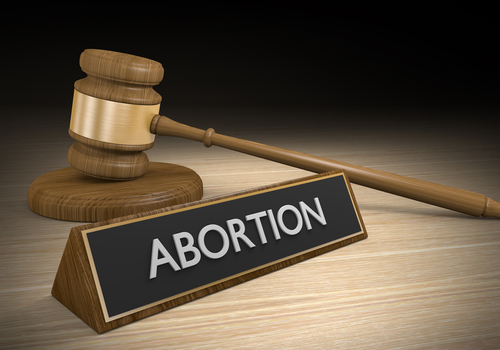Recent changes in SCOTUS raise the stakes in upcoming abortion case

Image from Shutterstock.com.
Every abortion case that reaches the U.S. Supreme Court has high stakes. The case that the justices will hear on March 4 is all the more momentous because of recent changes on the court.
The new case, June Medical Services v. Gee, involves a 2014 Louisiana law that requires abortion providers to have admitting privileges at nearby hospitals. The state was one of several to adopt such a requirement since 2012.
In 2016, the court held that a Texas law with a virtually identical admitting-privileges requirement placed an undue burden on women seeking abortions, and thus violated the 14th Amendment’s due-process clause. That case, Whole Woman’s Health v. Hellerstedt, was argued and decided 5-3, soon after the death of Justice Antonin Scalia.
Scalia was replaced in 2017 by Justice Neil M. Gorsuch. And in 2018, Justice Anthony M. Kennedy, who was in the majority in Whole Woman’s Health and was the critical vote on abortion cases for a generation, retired and was succeeded by Justice Brett M. Kavanaugh. Both Gorsuch and Kavanaugh are widely believed to be skeptical of abortion rights, and the June Medical case from Louisiana will be their first opportunity to show their cards on the merits.
Garrett Epps, a professor of constitutional law at the University of Baltimore and an astute observer of the Supreme Court, suggested in The Atlantic recently that the real—if cynical—question presented in the case is, “Now that Justice Kennedy is gone at last, do his old precedents still apply?”
The Louisiana case presents several specific legal questions, including whether the state’s admitting-privileges requirement conflicts with the Whole Woman’s Health decision. A federal district court held that it did, but a panel of the 5th U.S. Circuit Court of Appeals at New Orleans upheld the law in a 2-1 decision, with the majority saying there were significant differences in “facts and geography” between the Louisiana and Texas laws.
“The laws are identical—they are cut and paste except one says ‘Texas’ and the other ‘Louisiana,’” says Travis J. Tu, senior counsel with the Center for Reproductive Rights, which is representing June Medical and its Hope Medical Group abortion clinic in Shreveport, Louisiana., as well as two physicians using pseudonyms in the legal challenge.
“A change in the composition of the Supreme Court alone is not supposed to result in a change in women’s fundamental rights throughout our country,” adds Tu, whose New York City-based center successfully argued the Whole Woman’s Health case in 2016.
Louisiana Solicitor General Elizabeth B. Murrill says “everything” about the Louisiana case is different than the Whole Woman’s Health case from Texas.
“Our law is different,” she says. “The regulatory structure is different. Our geography is different. And the demand for abortion in our state is different.”
Murrill, who will argue her state’s case before the justices, adds, “We have ample evidence to justify the policy choice of the legislature to require admitting privileges.”
 Image from Shutterstock.com.
Image from Shutterstock.com.
Concerns over clinic safety
When Louisiana adopted Act 620, lawmakers cited lax oversight of abortion doctors and clinics, which they say led to a history of health and safety problems in the areas of record keeping, patient monitoring, and facility sterilization and safety standards. The hospital privileges requirement for doctors would, among other benefits, insure the inclusion of abortion providers in the National Practitioner Data Bank, which tracks physician malpractice and misconduct.
When the Louisiana law was set to take effect in 2014, six doctors performed abortions in the state. They sued to challenge the law even as several who didn’t already have them sought hospital admitting privileges.
In the meantime, the Supreme Court decided Whole Woman’s Health, with Justice Stephen G. Breyer writing for the majority that in the Texas case, “the record evidence indicates that the admitting-privileges requirement places a ‘substantial obstacle in the path of a woman’s choice’” and leading to the closure of abortion clinics.
Back in Louisiana, a federal district judge in Baton Rouge issued a final judgment against Act 620 in 2016. By that time, the state had five doctors performing abortions at three clinics, with only two of the doctors having admitting privileges. The judge found that three of the five doctors likely could not obtain privileges and two of the three abortion clinics would close if the requirement went into effect.
The 5th Circuit panel reversed, holding that “the admitting-privileges requirement performs a real, and previously unaddressed, credentialing function that promotes the wellbeing of women seeking abortion.”
The majority concluded that three of the five abortion providers did not make good-faith efforts to obtain hospital privileges.
The full 5th Circuit denied en banc review among some dissents, and the case drew widespread attention last year when Chief Justice John G. Roberts Jr. joined the court’s liberal bloc to issue a stay of the appellate decision and thus kept the law on hold.
Gorsuch and Kavanaugh joined Justices Clarence Thomas and Samuel A. Alito Jr. in saying they would have denied the stay application. Kavanaugh wrote an opinion for himself suggesting that a stay was unnecessary under this facial challenge to the law because the doctors still had time to seek admitting privileges.
‘Hanging by a Thread’
June Medical and the doctors appealed the 5th Circuit ruling to the high court, stressing their view that the appellate court did not faithfully apply Whole Woman’s Health.
“Abortion access in Louisiana is already hanging by a thread; if this law goes into effect, it will leave only one clinic and one doctor” performing abortions in the state, says Tu of the Center for Reproductive Rights. “The medical consensus has only grown stronger that these admitting-privileges laws are not providing medical benefits to women.”
June Medical is supported by an amicus brief from the American College of Obstetricians and Gynecologists, the American Medical Association, and numerous other medical groups.
“Abortion is an incredibly safe medical procedure, and it does not require hospitalization,” says Skye L. Perryman, the chief legal officer and general counsel of ACOG. “Admitting privileges serve no purpose when you’re talking about physicians and clinicians who perform abortions.”
The Supreme Court has granted review of Louisiana’s cross-petition for certiorari on an important jurisdictional question—whether abortion providers have “third-party standing” to challenge health and safety regulations on behalf of women seeking abortions.
The state argues in the high court that abortion doctors do not meet the difficult test to give them legal standing to sue to protect the constitutional rights of women seeking abortions. Women could challenge the state’s regulations on their own, the state argues, and abortion providers have conflicts in challenging health and safety regulations enacted to protect the same patients they are purporting to represent.
“The regulations exist to protect the patients and reduce the risks to patients,” says Murrill, the Louisiana solicitor general.
The law’s challengers say the state waived the third-party standing arguments early on in the litigation and that, in any event, the Supreme Court has three times held that abortion providers have third-party standing when a challenged law directly regulates their conduct.
 Image from Shutterstock.com.
Image from Shutterstock.com.
Tu of the Center for Reproductive Rights says the state’s standing arguments are a “Hail Mary pass” and an attempt for an “off ramp.”
President Donald Trump’s administration backs the state and appears to favor a ruling that the abortion providers lack standing. Both the state and the U.S. solicitor general say that the court can uphold Louisiana’s law as consistent with Whole Woman’s Health, but both also say that if they see the need, the justices should overrule the 2016 decision in the Texas case.
At least one anti-abortion group, Americans United for Life, called on the justices, both in a brief for itself and another in which it represents 207 members of Congress, to overrule the basic right to abortion the court recognized in 1973’s Roe v. Wade and reaffirmed in 1992’s Planned Parenthood of Southeastern Pennsylvania v. Casey.
“We think that with some clarity, the Louisiana law can fit within the framework of Roe and Casey,” says Steven H. Aden, the group’s general counsel, but “the court needs to take a close look at abortion law and decide what it really intends to say.”
Tu says he agrees that “this is not a case where Roe versus Wade is on the chopping block. But the stakes are just as high.”
See also:
ABAJournal.com: “Chemerinsky: Stakes are high as SCOTUS considers 2 major abortion cases”
Write a letter to the editor, share a story tip or update, or report an error.


